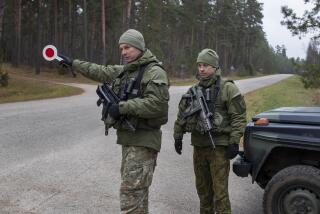SOVIET UNION / THE UNLIKELY EMIGRES : Russians, Ukrainians Eager to Migrate to Lithuania Before It Is Independent
- Share via
MOSCOW — America, Israel and West Germany have long been hot destinations for Soviet citizens eager to emigrate, but now Lithuania--the maverick republic that declared independence four months ago--has been added to the list.
“I decided to move to Lithuania as soon as it became clear Lithuania would be the first republic to become independent,” said Viktor V. Rechinsky, a 25-year-old fish breeder. “I knew it was on the path, not only to freedom from the Soviet Union, but to real moral and spiritual freedom.
“In Moscow, people talk very loudly about reform, but I’m not sure things will ever improve--materially or morally.
“It’s different in Lithuania. I think it will be able to go in the way of Czechoslovakia or East Germany,” Rechinsky said. “Czechoslovakia and East Germany threw away the Communist ideology easily, and Lithuania can, too, but in Russia it will be very difficult.”
Rechinsky is part of a small but growing number of Russians and Ukrainians, and possibly others, trying to set up new lives in Lithuania before the Baltic republic completely splits off from the Soviet Union.
Lithuania declared independence from the Kremlin on March 11 but suspended that declaration early last month, pending talks with Moscow. In the meantime, the tiny republic had suffered through a brutal 10-week economic blockade, during which the Kremlin stopped supplying oil, gasoline, gas and other raw materials.
But the blockade helped Yevgeni G. Souvrov make a vital decision. The 44-year-old Moscow electrician saw it as a gross injustice and decided that, despite the hardships imposed, he wanted to live there.
“I knew the blockade was unjust and that I should be on the other side,” he said. “So I decided to join the Lithuanians.”
Souvrov has spent most of his adult life struggling to bring democracy to Russia. Some 15 years ago, he published a two-page underground newspaper, and he was sentenced to a year in prison for the crime of anti-Soviet agitation.
During the perestroika years, he has helped liberal candidates with their campaigns for the local and national parliaments and participated in numerous pro-democracy rallies.
But he complains that after five years of Soviet President Mikhail S. Gorbachev’s reform program, there is still no assurance that Souvrov’s native land will ever have a healthy democratic system.
“I’m tired and bored of living here, where the reform movement is going so slowly,” Souvrov said. “I want to live with people who are trying to do the same thing I want to do.”
Souvrov and Rechinsky both appealed to the Lithuanian mission in Moscow for advice about moving to Lithuania.
About a year ago, the mission started getting phone calls from Russians interested in migrating to Lithuania. In the last couple of weeks, the mission has been swamped with such calls.
The would-be immigrants’ reasons for wanting to relocate are almost as many as the number of inquiries, according to Birute Nenartaviciute, an official at the mission. In her role as Lithuania’s ad hoc immigration service in Moscow, she keeps track of the inquiries in a stack of odd-sized sheets of paper.
“Some are Jews afraid of anti-Semitism in Russia,” Nenartaviciute said. “Some are Russians fleeing ethnic danger in Central Asian republics.”
Some of the applicants have sons and say they want to move to Lithuania because they believe that its military service will be more humane than the Soviet draft. Others are betting that the Lithuanian economy will reform faster than the rest of the Soviet economy.
“All of them hope and believe Lithuania will be a sovereign country,” Nenartaviciute said.
Many people are discouraged when they discover that moving to Lithuania requires about as much work as emigrating to a foreign country. Nevertheless, some 50 families have registered their intentions to relocate.
Finding housing and jobs are two serious hurdles for the would-be emigres. In addition, Lithuanian officials are not enthusiastic about the possibility of more non-Lithuanians in their republic, 20% of whose present population is Russian, Polish, Ukrainian, Byelorussian and Jewish.
“During the 50 years of Soviet rule in Lithuania, Russians moving into Lithuania were part of the Russification of our country, and we feel negatively about it,” commented Dalius Cekuolis, spokesman for the Lithuanian Foreign Ministry.
Despite Lithuanian resentment, the Russians who want to relocate do not seem worried about being targets of discrimination in their adopted land.
“Sure, some people will say mean things,” said Yelena Bezgezhskaya, 62, who also wants to move to Lithuania. “But this is not based on deep ethnic hatred. There are unkind people everywhere.”
More to Read
Sign up for Essential California
The most important California stories and recommendations in your inbox every morning.
You may occasionally receive promotional content from the Los Angeles Times.










